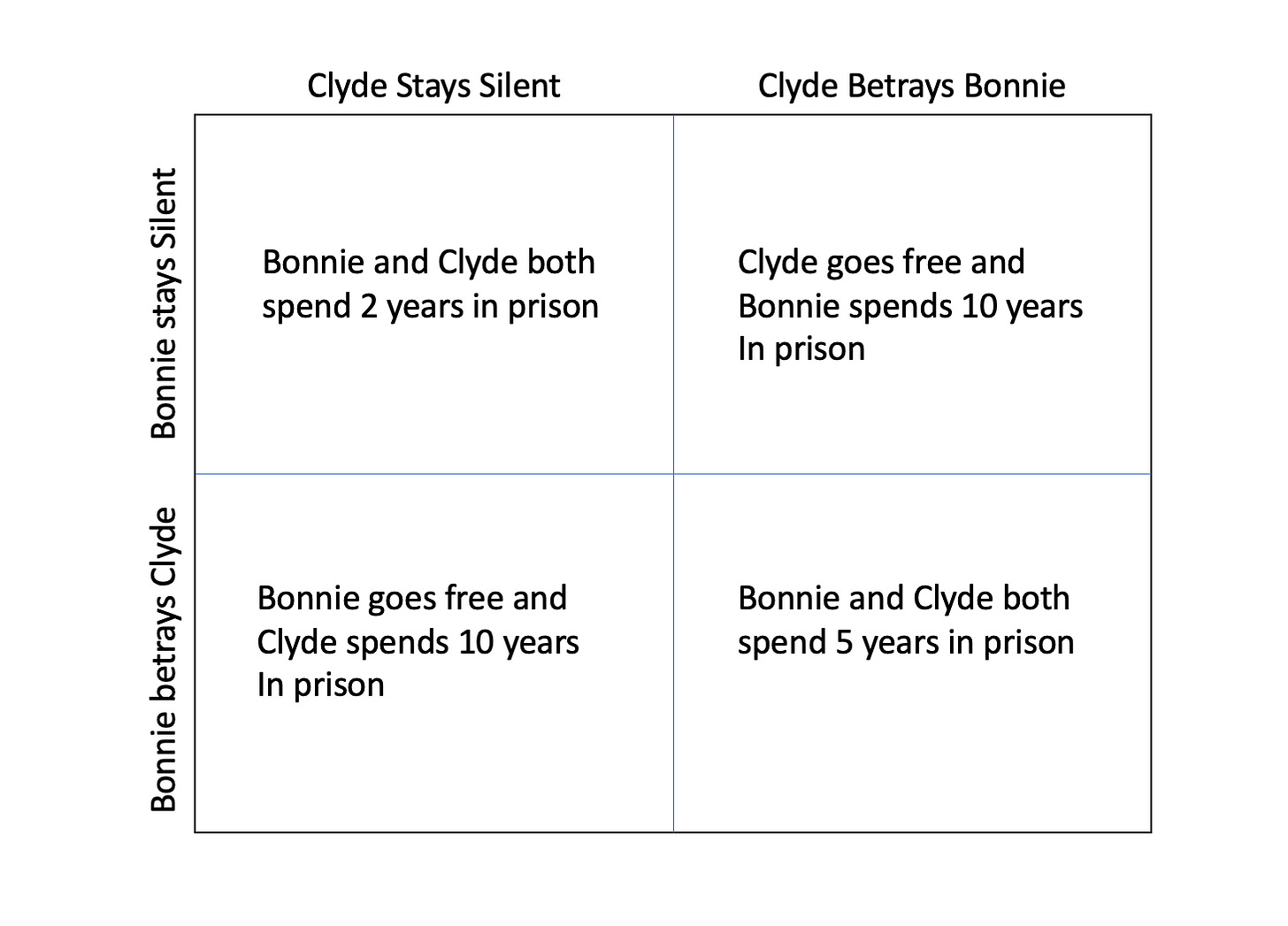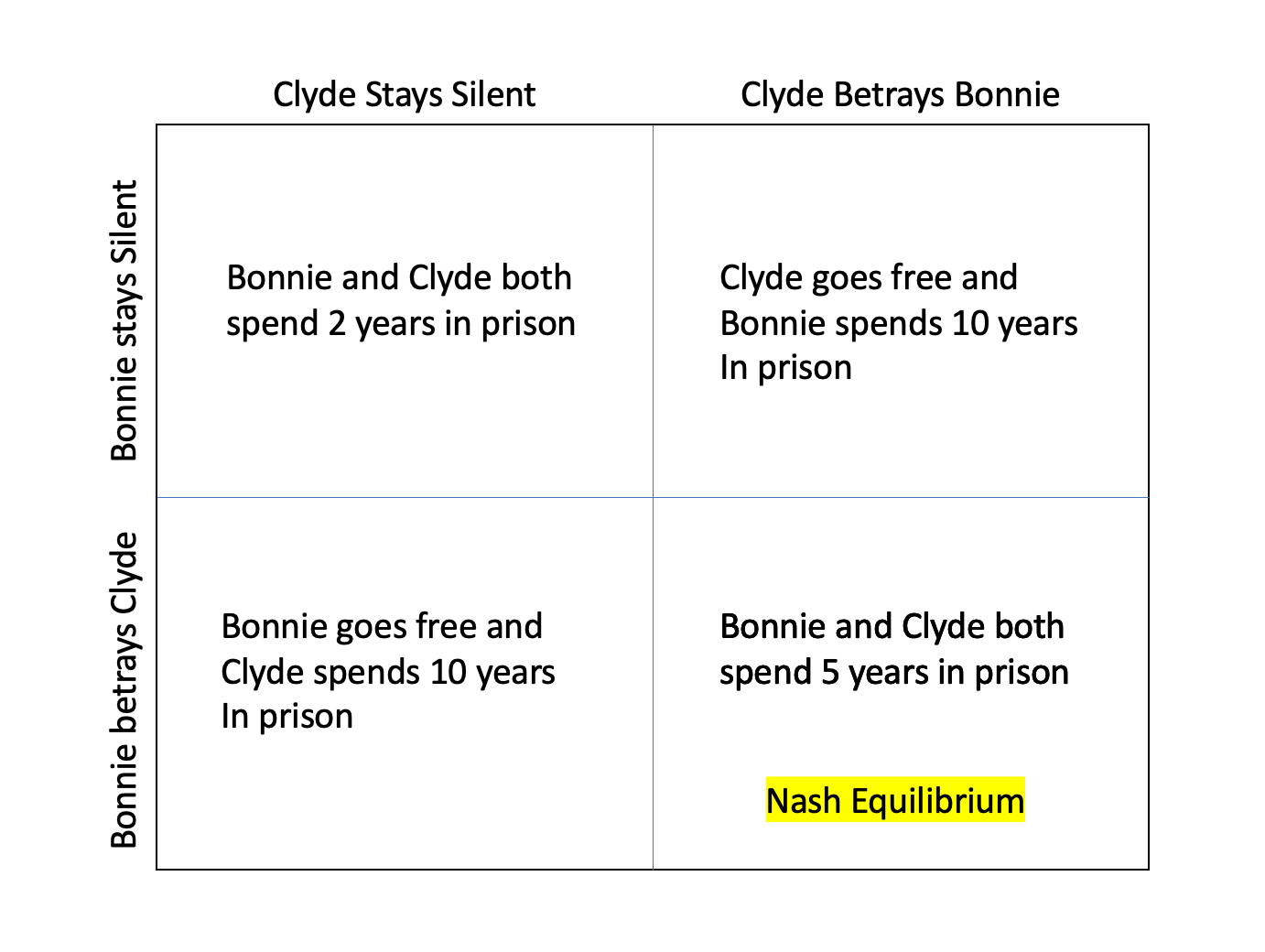Game Theory: The Prisoner's Dilemma
Considered one of the most famous thought experiments in competitive game theory.
Key Takeaways
Game theory has two main branches: cooperative and non-cooperative or competitive game theory.
The most famous thought experiment and competitive game theory is the Prisoner's Dilemma.
A player in a game has found a Nash equilibrium when they make the choice that leaves them better off no matter what their opponents decide to do.

If you're hanging out with your friends, you probably don't think too hard about math behind the decisions you're making. But there is a whole field of math and science that applies to social interactions. It's called game theory.
Game theory was pioneered in the 1950s by mathematician John Nash, the guy that Russell Crowe played in A Beautiful Mind. Game theory isn't about games the way we normally think about them. Instead, a game is any interaction between multiple people in which each person's payoff is affected by the decisions made by others.
So sure, that could apply to a game of poker, but it could also apply to practically any situation where people get together and get up in each other's business.
Did you interact with anyone today?
Well, you can probably analyze the decisions you made using game theory. Game theory is incredibly wide ranging, and it's used all the time by economists, political scientists, biologists, military tacticians, and psychologists.
Game theory has two main branches: cooperative and non-cooperative or competitive game theory.
Non-cooperative game theory covers competitive social interactions, where there will be some winners and some losers. Probably the most famous thought experiment and competitive game theory is the Prisoner's Dilemma.
Prisoner’s Dilemma
Prisoner's Dilemma describes a game, a social interaction, that involves two prisoners. We'll call them Bonnie and Clyde. Bonnie and Clyde were arrested fleeing from the scene of a crime.
Based on the evidence that police have, they are going to have to spend two years in jail.
However, the DEA wants more, so he offers them both a deal:
If you confess to the crime, and your partner does not, you will be granted immunity for cooperating. You'll be free to go your partner though, will serve 10 years in jail.
If you both confess and dish up loads of dirt about each other, then you will both end up spending five years in jail.
But if neither of you confess, you will both spend only two years in jail.
Bonnie and Clyde are then split up. They don't know what their partner is going to do. They have to make their decisions independently. Aside from having some wild times doing crime together, they don't have any special loyalty to each other. They're not brother and sister. They're hardened criminals. Clyde has no reason to think that Bonnie won't stab him in the back and vice versa.
Competitive game theory arranges their choices and their potential consequences into a grid that looks like this:
They both stay silent: If both Bonnie and Clyde choose not to confess, they'll both serve two years. In theory, this is the best overall outcome. Combined, they would spend as little time in prison as possible. If they could really trust each other, then this would be their best bet.
If only once confesses and the the other stays silent: The snitch walks free and the silent one gets 10 years. The immunity sounds pretty good but that's the problem. Bonnie and Clyde have no reason to trust each other.
If they both rat each other out: Compared to getting 10 years for staying silent, five years for turning on each other doesn’t sound so bad.
The Game Theory solution.
They should both confess and rat each other out. So, right now you're thinking, wow, game theory is a jerk. But it actually makes sense. That square in the grid where they both confess is the only outcome that has reached what's known as Nash Equilibrium.
Nash Equilibrium is a key concept in competitive game theory. A player in a game has found a Nash equilibrium when they make the choice that leaves them better off no matter what their opponents decide to do.
If Bonnie confesses and Clyde does not, she's better off because by confessing, she went from serving two years in prison to serving none.
If Clyde does confess, she's still better off than if she had kept her mouth shut because she'd be spending 10 years in prison. Now, she only has to serve five.
If she decides not to confess and Clyde keeps his pinkie promise, to not confess they'll both get out in two years. But that is an unstable state because Bonnie can't trust Clyde. She doesn't know what he's going to do.
This is not a cooperative game, all of the players stand to gain from stabbing each other in the back. The prisoner's dilemma is just one example of a competitive game.



